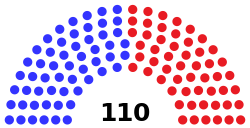
Back مجلس نواب ميشيغان Arabic Cámara de Representantes de Michigan AST Repräsentantenhaus von Michigan German Cámara de Representantes de Míchigan Spanish Chambre des représentants du Michigan French Camera dei rappresentanti del Michigan Italian Палата представителей Мичигана Russian 密歇根州众议院 Chinese Michigan Chiòng-gī-īⁿ ZH-MIN-NAN
Michigan House of Representatives | |
|---|---|
| 102nd Michigan Legislature | |
 | |
| Type | |
| Type | of the Michigan Legislature |
Term limits | 6 terms (12 years) |
| History | |
New session started | January 11, 2023 |
| Leadership | |
Speaker pro tempore | |
Majority Leader | |
Minority Leader | |
| Structure | |
| Seats | 110 |
 | |
Political groups | Majority
Minority
|
Length of term | 2 years |
| Authority | Article IV, Section 3, Michigan Constitution |
| Salary | $71,865/year + expenses |
| Elections | |
Last election | November 8, 2022 (110 seats) |
Next election | November 5, 2024 (110 seats) |
| Redistricting | Independent Redistricting Commission |
| Meeting place | |
 | |
| House of Representatives Chamber Michigan State Capitol Lansing, Michigan | |
| Website | |
| Michigan House of Representatives | |
The Michigan House of Representatives is the lower house of the Michigan Legislature. There are 110 members, each of whom is elected from constituencies having approximately 77,000 to 91,000 residents, based on population figures from the 2020 U.S. census. Its composition, powers and duties are established in Article IV of the Michigan Constitution.
Members are elected in even-numbered years and take office at 12 p.m. (EST) on January 1[1] following the November general election. Concurrently with the Michigan Senate, the House first convenes on the second Wednesday in January, according to the state constitution.[2] Each member is limited to serving at most six terms of two years, but may not serve more than twelve years combined across the Michigan House and Michigan Senate.[3][4] The House meets in the north wing of the Michigan Capitol in Lansing. The Democratic Party currently has a majority in the chamber.
In recent years, the Republican majority in the House has been widely attributed to Republican gerrymandering, implemented by the legislature after the 2010 census.[5] In many legislative elections since then, the Democratic Party has won the popular vote, but nonetheless failed to attain a majority. However, after the passage of Proposal 2, a 2018 ballot initiative, redistricting in the state was instead delegated to a nonpartisan commission, which drew new maps after the 2020 census. Aided by the redrawn district lines, in 2022, Democrats won a majority in the House for the first time since 2008.
- ^ "Michigan Legislature - Article XI § 2". legislature.mi.gov. Retrieved October 16, 2018.
- ^ "Michigan Legislature - Article IV § 13". legislature.mi.gov. Retrieved October 16, 2018.
- ^ Hendrickson, Clara (November 9, 2022). "Michigan voters approve Proposal 1 to modify term limits, require disclosures". Detroit Free Press. Retrieved August 30, 2023.
- ^ "Michigan Legislature - Article IV § 54". legislature.mi.gov. Retrieved August 29, 2023.
- ^ "In Michigan, an effort to take politics out of redistricting". PBS NewsHour. September 25, 2021. Retrieved November 12, 2022.
© MMXXIII Rich X Search. We shall prevail. All rights reserved. Rich X Search